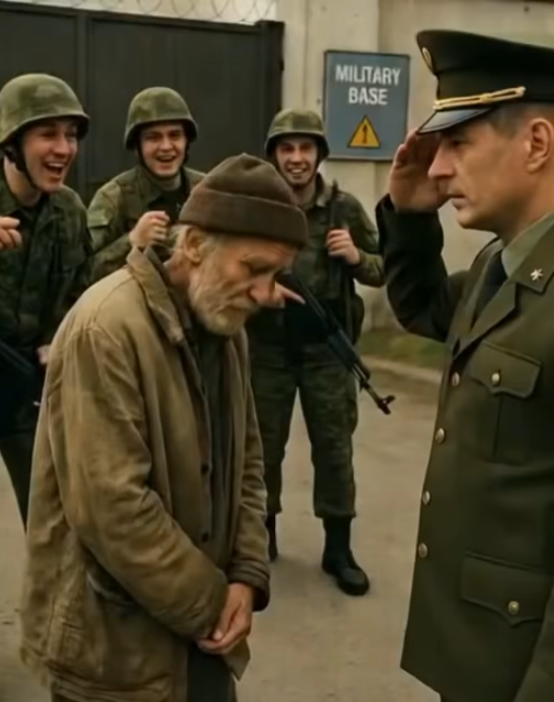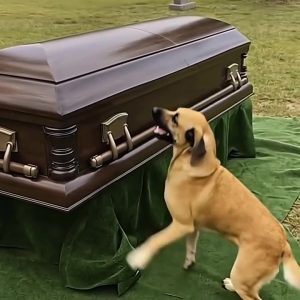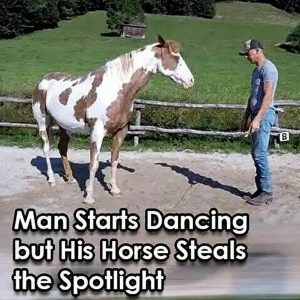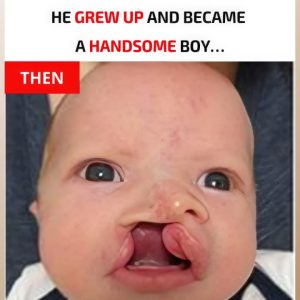It was visiting day on base — families and civilians had come to spend time with loved ones, tour the grounds, and attend a noon awards ceremony.
Just after 11:30 a.m., an elderly man arrived at the gate. He was thin, slightly hunched, wearing a faded jacket and boots that had clearly seen better days. He walked with a cane and carried a neatly folded American flag tucked under his arm.
The guards exchanged puzzled glances.
“You lost, sir?” one of them asked.
“No,” the man replied softly. “I’m here for the ceremony.”
A younger soldier standing nearby chuckled. “He’s probably just here for a free meal.”
A few recruits nearby laughed too. “Maybe he thinks this is a museum tour.”
The old man said nothing. He just stood there, eyes locked on the parade field.
An officer called over a superior. “We’ve got a civilian here saying he’s here for the ceremony. No credentials, no escort. Should we ask him to leave?”
Before a decision was made, the doors of the command building swung open. A general, fully dressed in uniform, stepped out with his aides. He spotted the old man, immediately straightened, and snapped a salute.
Everything stopped.
Lowering his hand, the general spoke loud enough for everyone to hear:
“Permission to speak freely, Master Sergeant?”
The elderly man straightened as much as he could. “Permission granted, General.”
Silence fell. The recruits who had been laughing now stood frozen, unsure whether to salute or apologize. The guards looked sheepish.
“I thought you were still overseas,” the general said.
“I came back a few months ago,” the old man replied, eyes still on the field. “Didn’t want a fuss. But I heard today mattered.”
“It does,” the general nodded. “And it just became more meaningful.”
Turning to a young officer, the general added, “Get him a front-row seat. And bring him some cold water.”
The recruits who had mocked him suddenly looked like they wished they could disappear. Some slipped away. Others offered embarrassed salutes. But the old man didn’t acknowledge any of it. He simply walked beside the general, still holding that folded flag.
A woman in the crowd leaned over to her husband. “Who is he?”
“I don’t know,” the man whispered. “But the general called him ‘Master Sergeant’ like he outranked him.”
As whispers spread through the crowd, people pulled out their phones, trying to figure out who this man was. But they found nothing. No name, no photos, no records. Just a flag… and a quiet presence.
The ceremony began. The old man sat silently as young service members were honored with medals and promotions. When the national anthem played, he stood with effort — holding the flag to his chest.
Later, the general returned to the podium.
“There’s someone here today who wasn’t on the schedule,” he said. “But he’s earned more respect than any of us could put into words.”
He paused.

“Master Sergeant Raymond Elkins.”
Gasps echoed. Some senior officers stood up in surprise.
“For those unfamiliar with the name — and that’s truly our loss — Sergeant Elkins served in Korea, Vietnam, and early deployments in the Gulf. He volunteered for the hardest missions. Not because he had to, but because he refused to send his men anywhere he wouldn’t go himself.”
The general looked over at Elkins.
“He saved lives. He shaped leaders. And he helped build the very foundation of this base.”
Applause erupted. Some stood. Others wiped away tears.
Elkins nodded humbly.
The general raised his voice again. “There’s something else. I learned just this morning — the flag he’s holding belonged to Corporal Jared Monroe.”
Murmurs spread through the crowd. Monroe was a hero. Killed in Afghanistan while drawing enemy fire to protect his team. He had been posthumously awarded the Silver Star.
“Corporal Monroe wasn’t just one of Elkins’ soldiers,” the general said. “He was his grandson.”
A hush fell over the field.

“After Jared died,” the general continued, “Master Sergeant Elkins didn’t retreat into grief. He requested to return to training duty. Not for recognition — but to make sure the next generation had a better chance of making it home.”
Elkins stood slowly, still silent, flag in hand.
“We’re not giving him medals or speeches today,” the general said. “We’re giving him something far more rare — our respect.”
The entire crowd stood, applauding with full hearts. Soldiers saluted. Families clapped until their hands ached.
Later, the general approached Elkins.
“They should’ve known who you were,” he said quietly.
Elkins chuckled. “They’re young. They’ll learn.”
“Would you like to say something?”
Elkins paused. Then, leaning on his cane, he stepped to the front.
“I’m no good at speeches,” he began, voice rough but steady. “But I’ll say this…”
He looked down at the folded flag.
“This flag doesn’t stand for politics. Or pride. Or power. It stands for people. Real people. Young people. Good people.”
He paused.
“I’ve seen men lay down their lives so others could live. I’ve watched boys become soldiers — and come home forever changed. Wearing the uniform doesn’t make us better. But it reminds us we serve something greater than ourselves.”
He looked at the young recruits.
“And maybe, one day, if you’re lucky, you’ll grow old. Maybe people won’t remember your name. But if you’ve lived with honor — if you’ve loved your country and cared for your fellow man — someone will remember how you stood when it mattered.”
Silence.
Then — applause. Long, thunderous, heartfelt.
That afternoon, as families left and the base grew quiet, Elkins sat alone on a bench. The flag rested in his lap. He didn’t look sad — just reflective.
The same recruit who had mocked him earlier approached hesitantly.
“Sir?” he said.
Elkins looked up.
“I wanted to apologize,” the young man said softly. “I didn’t know.”
“You didn’t need to,” Elkins replied. “You just needed to listen.”
The recruit sat beside him.
“Did you come just for your grandson?”
Elkins shook his head. “Not just for him. For all of them. Every kid who thinks they’re not tough enough. Every soldier who feels invisible. They need to know someone sees them.”
“I’ll remember that,” the recruit said.
“Good,” Elkins nodded. “Then maybe I did something right.”
Just as the sun began to set, the general returned one last time. He handed Elkins an envelope.
“What’s this?” Elkins asked.
“An official invitation. We’re naming the new training center after you.”
Elkins blinked. “You don’t have to do that.”
“We do,” the general said. “We really do.”
A week later, a plaque was unveiled:
The Raymond Elkins Training Facility
In honor of the quiet strength behind every brave soldier.
From that day forward, every recruit who walked through those gates learned his name — and his story.
And the recruit who once mocked him? He became one of the best in his unit. Later, he became a training officer.
On his desk sat a photo of Elkins — right next to a folded flag.
Because sometimes, the people who speak the least… teach us the most.





